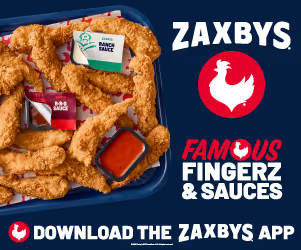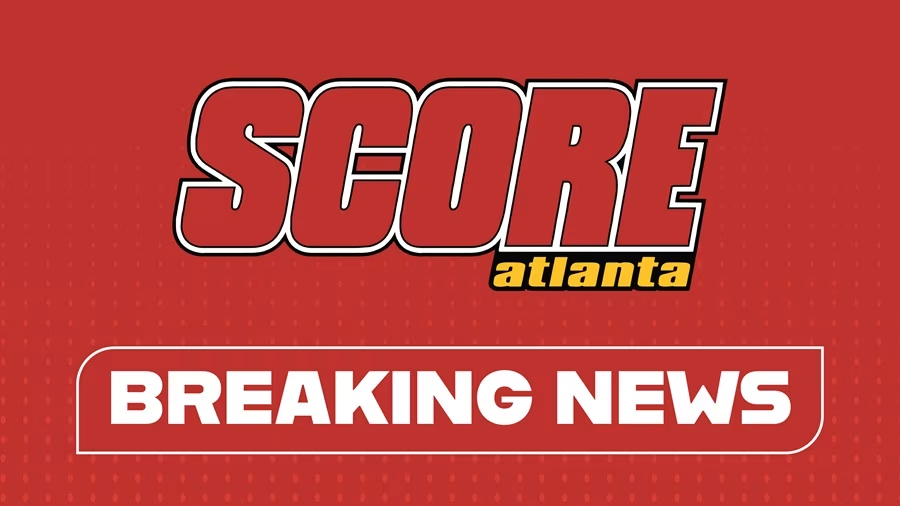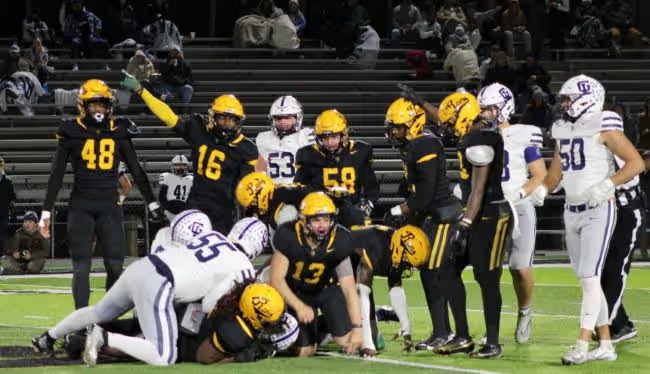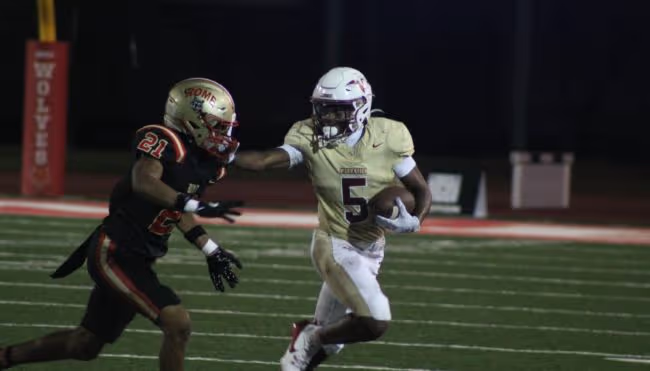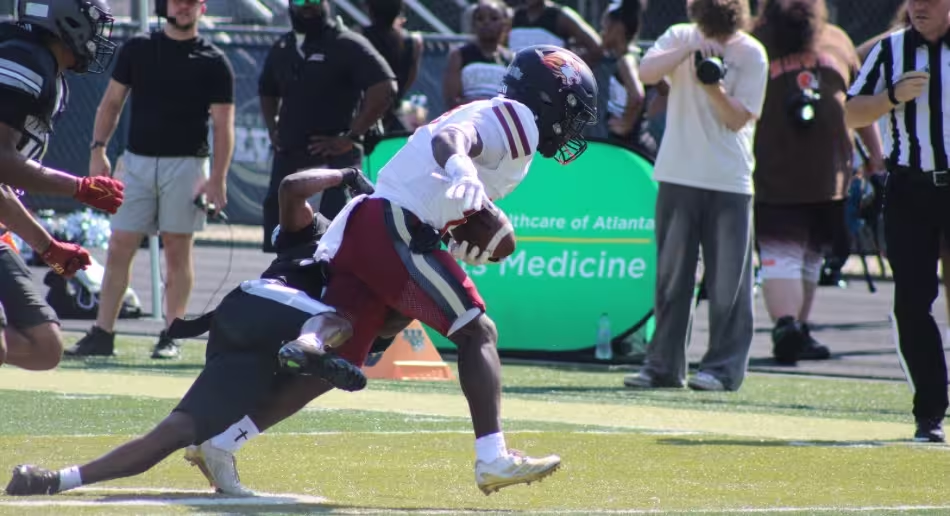The Atlanta Falcons have selected Carver-Atlantas Darren Myles as the franchises nominee for the 2024 Don Shula Coach of the Year Award. Established in 2010, and amended in 2011 to be exclusively an award designated to high school coaches, the NFL has awarded two high school coaches annually since 2022, one from the AFC and one from the NFL, that recognizes coaches who demonstrate character, integrity, leadership, and a commitment to player protection and the community.
When it comes to coach Myles, the Louisiana-native has fulfilled these qualifications as one of the most respected and accomplished head coaches in Georgia since beginning his coaching career. Myles was surprised with the news that he had been named the 2024 Atlanta Falcons Coach of the Year at the Falcons game against the Carolina Panthers and received two tickets to Super Bowl LVIII.
ICYMI: @NSC_Football head coach and @AtlantaFalcons Coach of the Year, Darren Myles (@Purduer91) joined @CraigSagerJr on todays episode of Georgia High School Sports Daily!
Watch Coach Myles full interview on the show today and read our story on the award at the link below! pic.twitter.com/IsBN49PGfn SCORE Atlanta (@scoreatlanta) January 13, 2025
Coach Myles graduated from Purdue in 1991 and began coaching at his hold high school Francis T. Nicholls (now KIPP Renaissance). He was the running backs coach and spent two years there and then had the opportunity to become an interim head coach the third season. An opportunity after that came up for for Myles to come to Atlanta as an assistant coach. His teammate in high school came up to Morehouse to play football and afterwards got a job at Douglass High School, where his high school defensive coordinator Michael Sims had become an assistant for one year and then became the head coach. Coach Myles saw the opportunity for him to come to Georgia where he could earn more money as a coach and a teacher.
Myles made the move in 1996 and became the running back coach at Douglass-Atlanta. Future NFL rushing leader Jamal Lewis was his running back at Douglass that he helped develop into one of the greatest running backs to ever come out of Georgia . In 1997-98, Myles was the offensive coordinator and running backs coach, and then in 2000, his friend Joseph Polk became head coach at Southside High School.
Myles followed him there to be his offensive coordinator and then he became the defensive coordinator at Morehouse.
Coach Myles took a year off and then got a phone call that spring at Crim High School. He went into that interview and they told him the school was going from a traditional school to a non-traditional school in two years. During the interview, coach Myles told them that two years was all he would need to prove himself as a head football coach and that he did. He took the job and helped blossom the career of one of his first prominent players in Inky Johnson. His first task to get Inky back to football, because he was coming off two injuriesa separated shoulder and dislocated ankle. Coach Myles met with his mother and shared his vision and got him to come out and play.
After two encouraging and successful years at Crim, the opportunity at Carver came about. It was a new school where they had a deal that there would be 100 freshmen at four different schools with four different principals. The alumni fought against the older kids coming to the new school, according to Myles. When he got his start in 2005, the football field wasnt done because they were redoing the school.
There was no track and no weight room.
I called the principal at Crim and asked if we could work out there during the summer and so I had the kids meet me there, reflected Myles. So my first meeting at Carver, I had just three players. Word got out and we got up to 20 guys. We built the foundation then and Ive been there ever since.
During his coaching career, coach Myles was an elementary school teacher for three years and he taught the 5th grade, which required him to teach all subjects. He was named Teacher of the Year as a 5th grade educator and oversaw the promotional exercises as the organizer. At the high school level, Myles taught 9th grade literature and 10th grade literature for six years.
The consistency and commitment to the students and Carver-Atlanta community that coach Myles has provided has led the Panthers to incredible success on the field. This years team finished an 8-4 campaign and reached the playoffs for the 13th-straight season. Before coach Myles took over in 2005, the team was coming off an 0-8 season where they produced just 24 points all seasons and they hadnt had a winning season or playoff berth in 19 years since the 1986 season. Transforming a program and building a culture that has already had a direct impact on hundreds of players is the ultimate reward for coach Myleseven more so than the region championships and 138 total victories he has experienced while leading the Panthers.
The personal gratification for me has been seeing the development of the players from when they come in as a ninth grader and leave as a senior, he said. Seeing those hours come to fruition, with the way they interact with their peers or a guest. It makes it worthwhile, and it is just part of our daily routine. Even if it is Fall break and we dont have school, Im calling the pastor and we are going to SAMs Club and keeping up our routine, whether I get breakfast and the pastor gets lunch, we work it out. Whether it is picking up biscuits or getting Gatorade.
Myles prioritizes the academics of all his players and has had several valedictorians on the rosterincluding Class of 2024 graduate and four-year starter Aquintis Clemmonswho is currently attending Rice University. Working with community pastors and his staff, Myles has character building every Tuesday in addition to team study hall before practices.
When it comes to disciplining his players, Myles has a contract that each player and their parents sign before each season and that provides a straight-forward standard that is universally applied to each student know matter how large or small their role is on Friday nights.
We have about 10 rules and some of the 10 are academic-related with staying eligible each year and staying on track, explained Myles. It is some of those things, but also we have disrespecting an administrator or smoking in season is 100 laps, which is like 20 miles and a one-game suspension. To give you an example, if any of those rules are broken, I wont have to think about what to do. We already had a player and parent meeting, the player signed it and the parent signed it and so we can look at the rules for example and say, look you put your hands on a female and the rules say you should be dismissed from the program. And so we dont tolerate it and so in that example we would say these are the rules, look Johnny, you are off the team. Same thing with smoking, if a trusted adult says they saw you engaging in that, then you are getting 100 laps and a one-game suspension. The rules are already written, so it is consistent.
Coach Myles strives to develop his players on and off the field and makes the process part of a daily routine.
Ill give you an example, in the morning I pick up the breakfast and the afternoon snacks because I do hold study hall as well. I pick that up in the morning from the cafeteria, so they dont have to stand in line or risk not getting breakfast. I bring that to the locker room and that way they have to see me. So they come through and they all have to say good morning. That is one of the things I have educated them onacknowledging your presence. So when they come in, it is good morning coach and Im speaking back. Plus, Im insuring they are eating breakfast that morning. In the afternoon, same thing. The bell rings at 3:30, we have a study hall and you have to be there. You are signing in and getting a snack and that is only 40 minutes and then you are getting to practice. On Monday, we do yoga. We have an outside organization that is called Project Dharma. So that has been used to teach them to bring, deal with stress and also manage their anger and anxiety. These answers come from surveys that the players filled out and this is what they said it helped them with. They talk about how it has taught them that inner strength and self-control. We know if someone isnt there and isnt saying good morning, or treating administrators with respect, saying yes sir or no sir, then we know there is a problem.
The Don Shula Award also looks at how each coach prioritizes player safety and coach Myles has gone above and beyond to make sure the health of each player is always at the forefront.
The way we view it is that there is no incentive to win games regarding a payout, said Myles. As a program, we are not making money per wins and so we prioritize health. That is what is most important to us. We had two players that were concusses this season and they went through the return to play safety measures until they were cleared to return. I have CPR training that is required every two years. I have yearly cardiac arrest training that is required every year. And AED training. So, I am trained for that if something happens. All our coaching staff is trained, and we do have an emergency action plan so if something were to happen, we know where to be on the field, who is going to be there to administer first aid to the players and who is going to continue to monitor the rest of the team while that player is being administered.
Over his 20 years at Carver-Atlanta, coach Myles has seen an average of five guys per graduating class receive scholarships to play at the next level and he has coached several guys that have reached the NFL level, with many of its recent graduates eyeing that opportunity in the next few years. As a result, elementary and middle schoolers are ecstatic and often star-struck when the Panthers hold their annual field day, and the team gets to connect and inspire the community.
The team works with the elementary and middle schoolers and one of our favorite community building projects is our field day because the young kids absolutely love it, said Myles.
The two finalists for the 2024 Don Shula NFL High School Coach of the Year Award will be announced in late January and each finalist will receive $15,000 from the NFL Foundation with $10,000 going to the schools football programs.

.avif)



.avif)
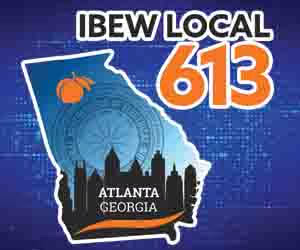
.avif)



